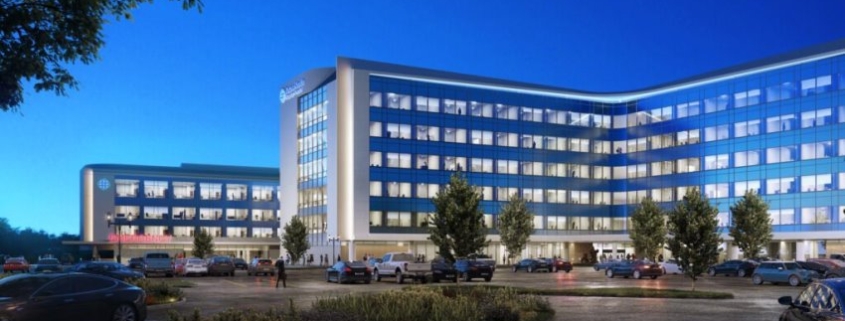Cornerstone Companies, Inc. has closed on its sixth medical office building portfolio; acquiring 12 healthcare real estate properties in nine states totaling more than 155,000 square feet.
The properties have been acquired by Cornerstone Fund VI for $48.7 million by Cornerstone MOB Fund VI, a private equity fund focused solely on medical real estate. Cornerstone is the fund’s general partner.
The fund’s portfolio includes six individual clinical MOBs, three clinic/ambulatory surgery centers, an imaging and diagnostics center, a senior care facility, and a single stand-alone ambulatory surgery center. The facilities are located in the Midwest, Southeast and Southwest
The Fund VI portfolio assets include:
• Gateway Clinic Medical Office Building in Moose Lake, MN – an 18,000-square-foot medical office building on the campus of Essentia Health’s Moose Lake Hospital, which is a level IV trauma center. Gateway Clinic is the largest independent multi-specialty practice along the I-35 corridor which connects Minneapolis and Duluth. Gateway Clinic provides five core specialties including general surgery, emergency medicine, family medicine, obstetrics and internal medicine.
• Owensboro Dermatology ASC in Newburgh, IN – a 10,000-square-foot dermatology clinic and ambulatory surgery center scheduled to be completed in November 2021. The new ASC and clinic will have eight exam rooms, four procedure rooms and one operating room. Owensboro Dermatology Associates is the market leading dermatology practice in the Evansville-Owensboro market, and the second-largest dermatology practice in a 100-mile radius of Louisville, KY.
• Vanderbilt University Medical Center Shelbyville Clinic in Shelbyville, TN – a 16,000-square- foot multi-specialty clinic including women’s health, endocrinology, internal medicine, wound care, family medicine, pulmonology and sleep medicine. VUMC operates nine hospital systems and 48 hospital locations, inclusive of clinics, physician practices and affiliates practices.
• Crestview Medical Office Buildings in Crestview, FL – three medical office buildings comprising more than 25,000 square feet on the campus of North Okaloosa Medical Center, approximately 45 minutes northwest of Pensacola. The buildings feature multi-specialty clinical space, including urology, cardiology, rehab, podiatry, primary care, sleep lab and human resources.
• Keystone Eye Associates ASC & Clinic in Philadelphia, PA – a 14,000-square-foot, full- service ophthalmology clinic and ambulatory surgery center. Keystone Eye Associates is one of the leading ophthalmology practices in Philadelphia, PA. Amongst 18 independent ophthalmology practices in Philadelphia, Keystone Eye Associates is the highest performing as ranked by procedure volume.
• Atlantic Gastroenterology and Endoscopy Center in Greenville, NC – a 9,000-square-foot outpatient endoscopic facility specializing in colorectal cancer screening and the treatment of various diseases involving the digestive tract. The property houses the twenty-year-old practice clinical practice as well as a two operating room ambulatory surgery center.
• Hollywood Diagnostics Center in Hollywood, FL – a 9,500-square-foot full-service diagnostics center including open and high-field MRI, CT scan, PET scan, mammography with 3D tomo, ultrasound and x-ray. The facility treats more than 30,000 patients per year.
• Surgery Center of Baton Rouge in Baton Rouge, LA – an 11,000-square-foot ambulatory surgery center which is home to the joint venture between Surgery Partners, Inc. and five leading interventional pain specialists. Surgery Partners is a leading operator of surgical facilities, with more than 180 locations nationwide. The Surgery Center of Baton Rouge is the market leading interventional spine practice providing procedures, therapeutic injections and neurostimulation in a state-of-the-art setting.
• Henry Ford PACE Senior Care in Pontiac, MI – a 30,000-square-foot facility providing primary and specialty care, physical therapy and assisted living services for aging adults. PACE of SouthEast Michigan is a joint venture between Henry Ford Health and Presbyterian Villages, the largest assisted living operator in Michigan. PACE of Southeast Michigan operates six facilities in southeast Michigan and is a nationally recognized leader in the Program of All-Inclusive Care for the Elderly (PACE.)
• OrthoArizona MOB in Mesa, AZ – a 10,000-square-foot medical office building that is 100- percent leased to OrthoArizona, the second-largest orthopedic practice in Arizona. The MOB provides clinical orthopedics, podiatry and physical therapy services.
All of the Cornerstone MOB Fund VI assets are supported by net leases with a weighted average lease term for the entire 12-property portfolio of more than 10 years. Fund VI is projected to deliver a five-year average cash-on-cash yield of more than 11 percent to its investors.
Cornerstone has acquired more than $150 million in healthcare assets over the past four years amongst five other Cornerstone MOB Funds. Cornerstone sold MOB Fund I in 2018, generating a 17-percent IRR for its investors. Cornerstone MOB Funds II, III, IV and V generated cash-on-cash returns in 2020 of 11.51percent, 11.49 percent, 10.51 percent and 12.03 percent respectively.
About Cornerstone Companies, Inc.
Cornerstone Companies, Inc. is a leading healthcare real estate firm, drawing on more than 35 years of experience. With an exclusive focus on the healthcare real estate industry, Cornerstone helps physicians, hospitals, and third-party owners across the nation develop, build, lease, manage and optimize their healthcare real estate while enhancing the patient and provider experience. To date, Cornerstone has successfully completed more than $1 billion of medical office developments and currently manages more than 100 medical facilities encompassing 7.7M SF. To learn more, visit cornerstonecompaniesinc.com.
Source: HREI




